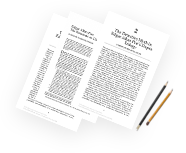1 page for each case answer each question within the case: ‘(1)Answer the following questions after reading the incident below: (1) What legal statute(s) apply in this case?; (2) What issue(s) must the court decide in this case?; (3) If you were the judge, how would you rule? Did the employer discriminate unlawfully? Why or why not? Abdul Mohammed, A Pakistani-American, was employed as a steelworker. As a devout Muslim, Mohammed was obligated to engage in daily prayer. Mohammed, along with five other Muslims working at the plant, asked management to provide a room where they could hold their daily prayers during lunch hour. The plant was located miles from the nearest mosque. Management told the employees that it did not have a room that could be used for such purposes. Consequently, Mohammed and his fellow Muslims were forced to recite their prayers in full view of other employees. Other employees ridiculed the Muslims during their daily prayers and called them derogatory names such as “camel jockey” and “raghead.” After being humiliated on several occasions by taunts from other employees, Mohammed and his fellow Muslims once again asked management to provide them with a private space in which to pray. Management again denied their request. Shortly thereafter, Mohammed filed a case with the Equal Employment Opportunity Commission alleging religious harassment and ethnic discrimination. (2) Answer the following questions after reading the incident below: (1) What legal statute(s) apply in this case?; (2) What issue(s) must the court decide in this case?; (3) If you were the judge, how would you rule? Did the employer discriminate unlawfully? Why or why not? Herbert Fox worked as an office furniture salesman for 25 years with the same company. In his 25th year with the company, he went on leave for clinical depression. When it was time for him to return from leave, he told the company he could not return to work as scheduled. Subsequently, Fox and the company agreed upon a new date for return. However, Fox also requested that he be allowed to miss the first couple of morning sales meetings ( a request prompted by the side effects of his antidepressant medicine) or to work on a part-time basis. His request was denied by the company, and they also told Fox that, because of increasing financial pressure, the company would be expecting 110 percent from him on his return to work. Fox did not report to work on the agreed-upon date and filed for disability benefits. The company subsequently terminated him. Fox filed a discrimination suit against the company alleging that the requirements attached to his return to work caused a relapse of his depression. (3) Answer the following question after reading the incident below: (1) What legal statute(s) apply in this case?; (2) What issue(s) must the court decide in this case?; (3) If you were the judge, how would you rule? Did the employer discriminate unlawfully? Why or why not? Thelma Jones had worked at a large public accounting firm for five years when the partners proposed her as a candidate for partnership. Of the 662 partners in the firm, seven were women. Of the 88 persons proposed that year, Jones was the only woman. Forty-seven were admitted to partnership, 21 were rejected, and 20, including Jones, were held for “reconsideration.” Thirteen of the 32 partners who submitted comments on Jones’ performance supported her candidacy, three recommended holding her application, eight stated that they had insufficient knowledge to comment, and eight recommended denial. While the partners praised her outstanding performance, both supporters and opponents of her candidacy indicated that she was sometimes overly aggessive, unduly harsh, difficult to work with, and impatient with staff. One partner discribed her as “macho.” In a meeting with a senior partner about her candidacy, she was told that, to improve her chances for partnership, she should “walk more femininely, talk more femininely, dress more femininely, wear make-up, style her hair and wear jewelry.” When the partners refused to reconsider her candidacy the following year, she sued the firm, charging sex discrimination.
#Human #Resources #Law




